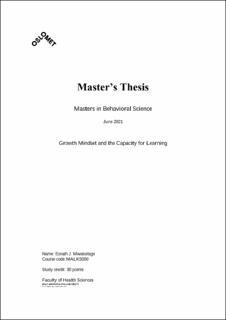| dc.contributor.advisor | Ree, Gunnar | |
| dc.contributor.author | Mwaiselage, Esnath J. | |
| dc.date.accessioned | 2021-10-04T17:34:46Z | |
| dc.date.available | 2021-10-04T17:34:46Z | |
| dc.date.issued | 2021 | |
| dc.identifier.uri | https://hdl.handle.net/11250/2787558 | |
| dc.description.abstract | The topic pertaining to motivation has been a theme that has had long history within scientific
research. A number of theories have tried to dedicate themselves in the investigation of this
phenomenon. One such field that has had a steady increase in the last years is Mindset theory.
Mindset offers a model that aims in explaining how the types of goals that are chosen by an
individual results in the exhibition of specific behavioral patterns. The theory has been
utilized in a number of interventions aimed at changing behavior in various setting such as in
schools and the organizations. Despite the spread of the theory, there seems to be evidence
that it still needs to be developed. Data from 162 employees of different branches of a
sporting goods brand was used to further investigate the effects of mindset on the key
performance indicator (KPI) for sales growth. The results from the investigation showed high
reliability, however there were no other significant co-variation between the elements of
growth mindset in the organization and KPI sales growth. On this basis the current study aims
to incorporate the perspective from both behavior analysis and neuroscience to further
develop the theory of mindset. | en_US |
| dc.language.iso | eng | en_US |
| dc.publisher | OsloMet - storbyuniversitetet | en_US |
| dc.relation.ispartofseries | MALKS;2021 | |
| dc.subject | Mindset theory | en_US |
| dc.subject | Behavior analysis | en_US |
| dc.subject | Verbal behavior | en_US |
| dc.subject | Neuroscience | en_US |
| dc.title | Growth mindset and the capacity for learning | en_US |
| dc.type | Master thesis | en_US |
| dc.description.version | publishedVersion | en_US |
